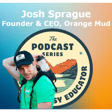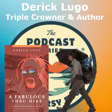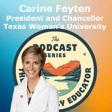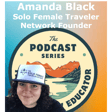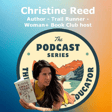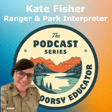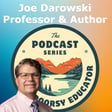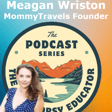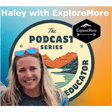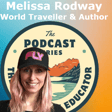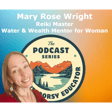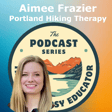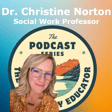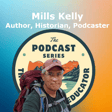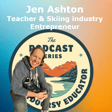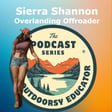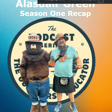Become a Creator today!Start creating today - Share your story with the world!
Start for free
00:00:00
00:00:01

Derick Lugo
Join Alasdair as he sits down with friend and author Derick Lugo, AKA "Fab" - You may know him from his debut book, The Unlikely Thru Hiker", but there is so much more to his story. We hope you enjoy this conversation!
Recommended
Transcript
Introduction to the Outdoorsy Educator Podcast
00:00:00
Speaker
Hello and welcome to the Outdoorsy Educator Podcast, the show where curiosity meets the open road. I'm your host Alistair and I invite you to join me as we explore the world through travel, nature, getting outside and the power of learning.
00:00:17
Speaker
Each episode we will dive into stories from inspiring educators, adventurers and global citizens who are reshaping what it means to learn whether it's in a classroom, on a mountain trail, or even halfway across the world. From backpacking trips that change your perspective to educational journeys that transform communities, we will cover it all. So pack your curiosity, lace up your boots, and let's discover how the world teaches us.
00:00:44
Speaker
One step, one story, one adventure at a time.
Sponsorship Message from Whole Earth Provision Company
00:00:56
Speaker
Since 1970, Whole Earth Provision Company has been the Texas outfitter for side quests, big and small. Whether you're gearing up for the open road, chasing a trailhead, or hunting for that just right gift, they have got you covered.
00:01:12
Speaker
Think durable clothing, shoes that will actually go the distance, gear that's road trip ready, and books, puzzles, and toys that will spark wonder at every age.
00:01:23
Speaker
You'll find Whole Earth in Dallas, Austin, Houston, and San Antonio, or anytime online at wholeearthprovision.com. And hey, because you're rolling with the Outdoorsy Educator podcast, here's a little extra love.
00:01:37
Speaker
Use the code OUTDOORSYEDU for 20% off your next adventure at Whole Earth.
Meet Derek Lugo: The Unlikely Thru-Hiker
00:01:50
Speaker
And on this week's episode of the Outdoorsy Educator podcast, we have a very special guest, my good friend, Derek Lugo. You may know him better as Mr. Fabulous Fab. Hopefully you've read his first book, The Unlikely Thru Hiker.
00:02:04
Speaker
Derek, how are you today? I'm great. How are you, Alistair? Yeah, doing very well. We've known each other for, I don't know, a few years anyway. um And we've we've got together. we've i was thinking about this this morning. We went for a hike in Alabama.
00:02:20
Speaker
We we hung out trail days in Virginia, then Oregon. So we're kind of doing our own little tour of the country where we hang out at random places. Yeah. Yeah. I think we connected. I did a ah talk for one of your classes. Right.
00:02:36
Speaker
Yeah. You've yet you've done that. I mean, that's got to have been maybe five years ago. down Yeah. Yeah. yeah and and And then we started following each other on social media. So, yeah. Yeah, it's been super awesome. Well, for those people who don't know much about you or who you are, why don't you tell tell the audience who is Derek, who is Mr. Fabulous?
00:02:55
Speaker
um yeah you Because you don't know. wait youki can't You can't do the intro. No, I'm kidding. That's right. I can't do as well as you.
Derek's Journey to Hiking and Writing
00:03:03
Speaker
So my name is Derek Lugo. I'm the author of The Unlikely Thruhiker and the upcoming book, A Fabulous Thruhiker.
00:03:09
Speaker
um i started I'm from New York City, so my first book is about me having zero experience. with the outdoors and the first time i i ever hiked was when I was on the Appalachian Trail. I didn't even know if I liked hiking.
00:03:24
Speaker
um I just saw it as a challenge and luckily i fell in love with it and it changed not only my life but my my career path.
00:03:35
Speaker
Yeah, I think like myself, we were both inspired by a Walk in the Woods, the the infamous, famous, I think it's a wonderful book, the Bill Bryson novel. I mean, it's it I will say, because a lot of thru-hikers, you know, aren't like they discover, um especially years ago, discovered, and that's what happened with me.
Inspiration from Bill Bryson and Embracing Positivity
00:03:57
Speaker
like I discovered the AT t through A Walk in the Woods, and it's a good read. It's fun, hilarious, and as a book, I love it.
00:04:04
Speaker
But as far as being like the book for the AT, lot of thru-hikers are like, nah, it's not really the book. But I will say, um it's ah it's i'm a big reader, and it's it's ah it's a great, great read. So yeah, it was how I was introduced to the AT.
00:04:22
Speaker
But the only thing i knew about the AT was what Bill Bryson had added in the book, that it was... you know, a through hike for a long distance hike from Georgia to Maine, 14 states, you know, and and that was basically it. And then when I did a little bit of research, when to start, um when not to start, got some of my gear and stuff. That's that's all I knew.
00:04:49
Speaker
Yeah, I don't think for me, I love it because I don't think it was ever intended to be a ah definitive guide. I don't think he wanted, I don't think he thought it would be what it, like it was just a funny story that he had to share.
00:05:02
Speaker
yeah But I don't think he imagined that it would be the book that everyone would turn to, especially in in in the beginning. Nowadays, there's so many other books they can, they can you know, read like the unlikely thru-hiker.
00:05:17
Speaker
But, shameless plug. um But yeah, yeah he's a He's a great writer. and in In fact, when I wrote my first book, I wanted my book to be as humorous as his.
00:05:32
Speaker
i just went a different direction because um he wasn't always positive about the AT and I wanted to be positive because I i wasn't going to inspire anyone to do anything. Not that I was trying to get people to through hike, but I wanted to people to like step out, like what I did, step out of your comfort zone, do something out of the ordinary or live a dream you didn't know you had.
00:05:55
Speaker
So that was ultimately what I wanted to do. Just share my story and people can take it and hopefully, be inspired, you know? Yeah, that's when I read your book. I mean, that's when we first connected was when I bought your book.
00:06:10
Speaker
So I didn't really know you at the time, but read the book. And for me, it made the outdoors accessible. You know, it's a bit like in my head, like if you go to the gym and you see, know, Johnny Six Pack lifting 300 pounds and you're like, this isn't for me. This is too big. Yeah, it's not for me.
00:06:27
Speaker
To me, it made it relatable, accessible. You don't have to have $8,000 worth of gear and have all this experience. You can just give it a shot. And that that's what I still want people to know is that now, okay, now I went from having zero experience, knowing nothing about the outdoors to now I'm...
00:06:48
Speaker
writing nonstop about it and and doing talks about the outdoors and all these other trails. But I want people to know that I haven't changed. I'm still that same person. i just have a little bit more experience. So when you still read my stories, you're going to read the downs. You're going to read the ups. You're going to.
00:07:07
Speaker
The key for me is that. I'm human. We're all human. And I'm going to get knocked down. But the key part is how do I react after that? What am I going to do when I get knocked down? Am I going to stay down am going to get up and move forward and and and do it in a way where it's...
00:07:24
Speaker
ah Again, um I try to keep it as positive as possible, but I want people to see that, hey, I knocked i got knocked down. um There's moments where I'm like, man, what what is happening?
00:07:37
Speaker
There's several moments in every trail where I thought this could be it for me. I'm sure. I wanted people to to see that.
00:07:48
Speaker
Although that popped in my head, i was thinking, how do I get out of this? You know, so quickly you get that that thought in your head. The next thought should be, how do I get out of this? And then you get out of it and and you and you move on and it becomes ah a type of fun. It could be type one, two, or three.
00:08:05
Speaker
Right. And those are normally three where you're like, I never want to do it again, you know. Yeah. Right. This is a one and done situation. Yeah. um So I don't want to actually I think when you do interviews, people want to dive into your hiking a lot because that's what everyone wants to know about. It's where people know you from.
00:08:25
Speaker
And while we're going to touch on that, I'm sure throughout the interview, I want people to read your book. That's the best way to find out about you know the hiking. um But before you you've mentioned that you hadn't really been into hiking, you were the manager of a bar, you did construction. I mean, you were not in the outdoor industry at all. Is that correct?
00:08:44
Speaker
Yeah, no, I worked at um most of my life. I worked in New York City. I was a bar back and became bartender. I've done some carpentry um in ah Pennsylvania, I did some in when I lived in Italy, some in New York.
00:09:02
Speaker
um very I come from a family where we're just like really good with our hands. ah So yeah, I would try a bunch of things and try to be really good them. And I feel like...
00:09:14
Speaker
with anything that I focus on, I try to you know exceed what people expect. And I feel like I could have had a career in a bunch of different um things. And I just would, I love, again, working with my hands. I love that. That's a passion of mine.
00:09:32
Speaker
But, Ultimately, telling stories was the one out that won out. And I feel like with Carpenter, I can do it for myself. But with writing, i do it for myself and others. i feel like I can reach more people and hopefully um people can get something out of what I'm i'm sharing with them.
Becoming an Author and Writing Process
00:09:52
Speaker
Yeah, so as as most people listening to this will know, I'm in education. I have been my whole career in a couple of different capacities. But one fairly common thread is a lot of teachers feel they have a book in them, and whether that's a kindergarten book or, you know, middle schoolers writing, you know, because they know kids and they know what works and they know what they want.
00:10:12
Speaker
99.9% of people never do anything with that. So I'd love to talk to you about sort of post hike. There must have been some point where you thought maybe it was before you started hiking, maybe I'll write this down or maybe it was during the hike or after the hike. When did that become an idea and then go from just an idea to actually this might be something I do with my life?
00:10:32
Speaker
Yeah, yeah. ah Before I threw out the AT, I've written a bit. i've done so I've written short stories. I have several manuscripts, but none of them were published. It was one of those things where I was just writing just to write while I worked full time in New York City.
00:10:51
Speaker
um But it was something that I like to do. When I did the AT, halfway through it, people were just coming up to me and saying, you need to write your story. um For several reasons. One, um the year I threw out the AT in 2012, they weren't really... And I didn't notice until people were coming up to me and telling me.
00:11:11
Speaker
Because I'm from New York City, the the mixing pot the world. But people were coming up to me saying, hey... you know We're glad you're out here. Thank you for coming being out here. you know There's not many people of color out here. Because at first I was like, well, I'm glad you're out here too. Not understanding what they're saying. Right, right.
00:11:26
Speaker
But they were like, no, there's not many people of color out here, um which I found kind of sad and didn't really... i didn't i just didn't understand why that that was a thing.
00:11:38
Speaker
So then that was one factor. And there was another factor where I went... I was like... Like my friend said and in in my book, Nina, she's like, you're the most metrosexual black man in New York City. Because I wanted it to always have designer clothes. I had to look fresh. I shaved, you know, twisted my locks, you know. Like it was just it was a city thing for me, you know. i just, you know, and maybe because, I don't know, maybe because I was in my twenty s and I don't know.
00:12:04
Speaker
but um But when I got on the trail, that kind of changed a bit. And when people, again, when people started sharing that it was – you know, it was nice to have someone different on the trail. I knew that this was something I wanted to share with people.
00:12:19
Speaker
And once others heard that i was ah that I was a writer, they were like, dude, you got you got to write a book. You got to write a book. And I've heard stories of other people writing books and they haven't been successful. Obviously, I knew about Walking the Woods, but there's others that were pretty successful. But I didn't want my book to be a journal.
00:12:40
Speaker
didn't want it to come out. like i didn't I didn't want it to read. like Someone was like following me every day, but we like I had oatmeal for for breakfast and I did 10 miles and and today was sunny. and it just didn't It's not interesting for me. right so The key point when I had decided that I wanted to write about a halfway through my through hike,
00:13:03
Speaker
I said, okay, I'm going to take extra notes because I write a journal even before that. then writing journals since I was a teenager in a journal. And decided I would take more notes, be more a bit more detailed with with my journal and take more photos and and stuff like that.
00:13:23
Speaker
And... Once I did that, then i knew what I had to be able to do. And the key is, is to be able to share a story and still make it sound interesting.
00:13:35
Speaker
And I knew that i was i new I was pretty good at sharing stories. We sit around a campfire and share stories. and i And I knew I had that going for me, but I wasn't sure if I can translate that into paper, into print, words that people could read.
00:13:54
Speaker
Um, and, um, but I said, you know what, going to try it. I'm going to go for it. And, um, this was the first time that I wrote something that I knew i was going to get published. I didn't know how I was going to do it.
00:14:10
Speaker
I just knew. i just knew. So I didn't worry about how to market it, how to get it, how to find a publisher. I didn't know. I didn't worry about that until I wrote the book, the manuscript at least, because I didn't want those other things that I would have to deal with in the future to affect the story I want to share.
00:14:29
Speaker
And I wanted to just keep going at it nonstop and until I was done. And then I would move on from there. I love it. So when you you you finish the trail, um like I said, I don't say too much about it because I want people to read your book because you'll tell the story so much better than I do.
00:14:48
Speaker
But you get off the trail, you you know let's say you you write your manuscript. I'd love for you to share, like I said, we have listeners and lots of people who feel, you know I've got a story to tell. I've got a book in me, whether that's a book for kindergarteners a thousand page blockbuster. People feel they have a book in them.
00:15:07
Speaker
I certainly have no idea what the process is like from having an idea, putting ideas on paper to having your book on a shelf in a local bookstore. Could you get a talk us through that process? What is you did to make the unlikely thru-hiker a reality?
00:15:24
Speaker
Yeah, I'll share my process. I actually had a couple i had a couple that I approached differently for each book. So um for my first book,
00:15:37
Speaker
When I finished the Appalachian Trail, I wasn't working. I didn't have a job. I had ah had already, even before the AT, I was working, but kind of like, I was already like two or three months where I wasn't working.
00:15:53
Speaker
And I decided I'm gonna extend that a bit longer to do the the AT. So that was one thing that was different with the first book than the second one. So the first one, since I wasn't working, I said, okay, I'm going take advantage of this time that I have before I have to start earning some money and paying bills, you know?
00:16:15
Speaker
So i had three months. I finished the AT in September, middle September, In October, i was able to, a friend of mine let me stay at a cabin for three months for for the winter.
00:16:29
Speaker
So from October, November, December, for three months, um I was able to write nonstop ah with no distraction. So I was in a cabin, didn't have Wi-Fi.
00:16:41
Speaker
I would have to ride a bike to a town, which was really close to get Wi-Fi, which I really liked. So the the first process was... I decided, since I have this time, I'm going to, every day get up early and write.
00:16:58
Speaker
started like 500 words day. Then went up 1,000. Then it went to 1,500 as
00:17:03
Speaker
you know, continue writing and I was progressing. So I wouldn't stop writing. I would turn off my phone. um if my My brain is a little, you know, it goes all over the place. Like most people, you know, you get distracted, but it it wasn't as distracted as if I was in New York.
00:17:22
Speaker
So I would have a piece of paper next to my laptop. And if something popped in my head, that was really like, I need to get it done. Cause it's always like that when you're sitting down and you want to focus on something productive, something else pops up and you just squirreled. Always, always. Yeah.
00:17:40
Speaker
So what you, what I do is I'll write it down. And once I write it down, it's out of my mind. It's like, okay, I'll take care of that. I'm not going to forget it. It's written down. So I wrote, I would write it down.
00:17:51
Speaker
So then i just said, whatever program you you you have, you should have ah be able to see a word count.
Writing Habits and Overcoming Procrastination
00:17:57
Speaker
And i started with 500, ended up with like 1,500 words a day. And sometimes I would go until 12, sometimes 12.
00:18:06
Speaker
Two o'clock in the afternoon. There was times where I was towards the end. I was done by 10, you know, in the morning, depending on what time I woke up. ah So I would keep doing that because I knew that I wasn't going to finish a book in three months.
00:18:21
Speaker
But I wanted to start a routine and that's the key with anything. You wanna start a habit, you wanna start a routine. If you don't have that routine, it's not gonna you know it's it's it's goingnna be a struggle. You're gonna be staying for years. I had a friend when I was writing my first book, she said, yeah, I know someone that's been working on this book for 25 years. I said, I'm not gonna be working on this book for 25 years, okay?
00:18:45
Speaker
I may be working on it for yeah for a few years, but not 25 years. right um So I knew I had to change it up. I couldn't treat this manuscript like I treated my other ones.
00:18:57
Speaker
It had to be something that I knew was going to get published. And so that was my approach for the first one. The second one was different. second one was three years ago.
00:19:11
Speaker
When I finished hiking the Continental Divide Trail. By then, my first book was out. It got some momentum. People knew about the book and a bit about me.
00:19:22
Speaker
So I wasn't like I didn't go into this book being an unknown. Like I got off the trail and quickly was being asked to do certain talks and stuff like that. So I really didn't have the time.
00:19:35
Speaker
I couldn't sit down and do 1,500 words a day. So I had to adjust a bit. And I decided, well, since I can't do a word count, I'll do ah time i'll do time. So ill I'll set a timer and do a half hour.
00:19:52
Speaker
every day. i think I started like 20 minutes and then it went 20 minutes. It went 45 minutes and it went an hour. So I did it by time. So I would write, keep writing.
00:20:04
Speaker
And also during that, during, for both processes, when i When I write, and I've learned this, I forgot where I got this from, and it's so helpful.
00:20:15
Speaker
When you write, don't worry about spelling. Don't worry about punctuation or grammar or the format. Don't become like, you know, don't procrastinate with little things like that, because that's ultimately what you're doing. You're procrastinating.
00:20:31
Speaker
Forget about all that. Just put down the words, put down your thoughts, whatever. If the story is flowing, just type it. Just, it's gonna look, it's not gonna look pretty, okay? right my My first draft is like a puzzle. There's times where I had one piece of the chapter in the beginning and then another piece was on a different chapter and then I ended up piecing them together. You want, the key is not to have a pretty manuscript The key is to have those words down, even if it looks like mumbo jumbo.
00:21:01
Speaker
Like eventually, if you're writing some, obviously when you're writing, you're going to try to want to have some kind of, um, I don't want to say structure because it's it's ultimately what you're doing is you're writing a story and a story should follow, you know, what yourre your your thinking pattern.
00:21:19
Speaker
But there's times where you're gonna have, I'm going I've had paragraphs. i'm like, I don't know where this belongs. I don't remember. But you set that aside, it's written and eventually it'll come back to you, which it normally does when when I'm working on a project for a long period of time. So the key is just to get there and write. So I would write for...
00:21:38
Speaker
20 and then ended up being I'm writing the same amount of time I was writing when I first did my first book. So I would do an hour and then it would go five hours, six hours. So depending on where I was um during it, if I had a talk or if I didn't, but the key is always to have it in the back of your mind that this needs to get published.
00:21:59
Speaker
This is something that i really want people to see. If it's ah if it's your if fit's your goal, you could write a poem and say, i don't want anyone see it, fine. But the key is to write every day because writing is a craft.
00:22:13
Speaker
And in order for you to polish your craft, to be good at it, you got you have to do it every day. One of the things I get from when I do um book signings or book events, I'll get young writers that'll come up to me and they say, hey, can you give me advice on, can you just give me any kind of advice on writing?
00:22:33
Speaker
And the way I respond is I'll ask them a question. I go, hey, are you writing every day? And I would say the majority of the time, would say 90% of the time, if not higher than that, 95% the time, they say no.
00:22:46
Speaker
they say no And I said, why don't we start with that? Because whatever whatever I give you right now, and I can draw some some some good stuff for you to kind of follow at least a guideline that helped me.
00:23:01
Speaker
You could take pieces of whatever, because I'm not saying everything that I do is going to work for you. But if you could take something... then then you know that would be you know great but um start with writing every day whatever that entails if it's just you writing a few sentences that's you writing um but it has to be something every day if you want to just write in your journal write in your journal at this point I write in my journal every morning And then I'll write whatever project I'm working on. And then I'll write at night in my journal.
00:23:32
Speaker
It's just something I've always, always done since I was a teenager. So the key is... just ah whatever you need to do to sit down and write. I understand everyone is different. People have families, they have, you know, you have kids or i think your kids are grown now. So i think you got a little bit more freedom.
00:23:52
Speaker
But if you have kids, you know, just take a moment, even if it's 15 minutes to write. You know why? Because that 15 minutes of you writing something is going to feel so good.
00:24:04
Speaker
Because ultimately, if you want to be a writer and you're not writing every day, you're thinking, wish I was writing, I wish I was writing, I wish I was writing. You know, and that's, it's daunting. It's something that you don't want there. Like, I, like, if I'm not writing every day, if I miss a day or two, I'm like, man, like this weekend, I was cleaning my apartment. I'm like, I gotta, I gotta write. You know, the itch. Yeah. Yeah.
00:24:24
Speaker
So that's roughly my my process. We can break it down a bit more if you want, but that's how I approach depending on where I'm at in my life. And I think that first process will probably not be a thing anymore. I think it would be more time with me, um but i you know I could, it could be, you know if I'm working on a smaller project, I could i could do the word count as well.
00:24:50
Speaker
Yeah, it's so interesting because I taught ah third grade and fourth grade as well as other things, but for years. And those are really like our big times of getting kids into writing. And we would, kind of the structure of my lesson every day was getting kids hyped up about writing for 10 minutes. you know, I had a structure, this is what I'm gonna talk about.
00:25:10
Speaker
And it was, you know, get them all jazzed. And then it was turning on some quiet music and you just write for, depending on the age level, seven minutes, 10 minutes, 15 minutes. but it was so interesting because I told them you're not allowed to ask me any questions you're not allowed to ask me how to spell a warrant if this is okay and because you just need to write and then we'll we'll deal with that we'll work at that look at all of that and and help but just write and it was so interesting how many kids even at eight years old struggled with that because they wanted it to be perfect the first time because they were excited about it so they wanted it to be great
00:25:46
Speaker
But they would stall out every third word because they just wanted to go, Mr. Green, how do you spell? How do you spell? How do you spell? Or wanted validation rather than just being able to let it flow. And it sounds, whether you're eight years old or 58 years old or 20 years old, it's almost the same.
00:26:03
Speaker
i think kids need to know about editors. Right. Yes. I think they, in their mind, and I may have thought this too when I was younger,
00:26:14
Speaker
It has to be perfect because whoever you give it to is going to publish it, you know, that way or, or if, you know, share it that way. They're not. No, they need to understand that there's other people. You're not doing this alone.
00:26:26
Speaker
The story may be yours, but you'll have help. Especially if you're trying to get it published. what what If it's like a newspaper, whatever, there's editors that will help you. And I think writers need to understand that editors are on your side.
00:26:40
Speaker
Some people are like, this is my baby. you know i don't i don't I don't want anyone touching or whatever. No, editors make your work better. So I think kids need to know that the teacher is your editor and and and you can just write it down and don't worry about anything else. Just share the story. well We'll piece it together and make it nice and clean together.
00:27:00
Speaker
And it's funny because I didn't really think about this until you were talking just now. So I'm writing my dissertation for my PhD right now. I'm about halfway through. And the lady who's the chair of my committee, shout out to Becky, who I've known for a decade.
00:27:14
Speaker
She did sit, she sat down with me and said, look I need you, I've done dozens of these. I need you to know how this is gonna work. You're gonna turn this into me 10 times and I'm gonna send it right back to you 10 times with edits to make.
00:27:28
Speaker
the The tough part of the dissertation is not letting that defeat you, is not feeling, oh, it's perfect, and then it comes back with things that you need to edit and change time and time again. That happens with every single person.
00:27:44
Speaker
And the the hardest part of the dissertation is not the writing and the research. It's not letting that beat you down or feeling like feel like you're just a terrible writer. And it's tough.
00:27:54
Speaker
It's tough having somebody critique your work that you think is fantastic and you're feeling all pumped and jazzed about it. ah But it's okay. It's okay. It's part of the whole bigger picture process.
00:28:05
Speaker
Yeah, I think, again, the more you write, the better you're going to get at it. And you have to be confident with your work. And you're going to, you have to understand that not everyone's going to love it.
00:28:16
Speaker
You know, I've been doing this for a while now, and I don't, I'll look at some reviews, ah but there's also reviews. it's You're never going to have what any writer. You could be like a New York Times bestseller.
00:28:30
Speaker
You're never going to have everyone that's going to agree that it's a great book. yeah know it's right even Even bad books have fans. like You know what and you know I mean? So it's one extreme or or the other. but up And you you can't you can't take that to heart. If you feel good about your work,
00:28:50
Speaker
like i know the unlike I know I'm a better writer now than I was when I wrote ah when i first wrote The
Influence of Stephen King on Derek's Writing
00:28:57
Speaker
Unlikely Thru Hiker. okay Now, I can't i can't take... to Even when people say um you know it's a great piece of work, you've done this.
00:29:06
Speaker
like I know I'm better now. And I'm like, yeah, that's that was who I was. um That's my story then. Now I have an and a new story that I'm sharing.
00:29:17
Speaker
And even... When I move forward and write other stuff, I'll go back and say, hey, this is my, um I love Stephen King. I learned a lot from him. And he says, he said that when he wrote Carrie, like it's one of those books, like some books he doesn't remember how he wrote it. For many reasons he doesn't remember, but but there's some, he didn't think it was a good piece of work.
00:29:38
Speaker
You know, he was like, his wife is the one that, I think he threw the manuscript, if I remember correctly, in a wastebasket and his his wife took it and he was gonna go back to teaching. And he was he she grabbed it from the wastebasket and was like, we should give this a shot.
00:29:53
Speaker
and That's fascinating. I didn't know that. That's really interesting. Yeah. i yeah So, i mean, again, it i got turned down so many times when I wrote, when I was trying to pitch my first manuscript.
00:30:07
Speaker
But I knew that was the process. I've read... and and seeing stories of of writers just struggling. And I knew I'm stepping into something that it's going to take a while for me to to get my foot in and then make something happen. Cause it's been, you know, I did the 18, 2012. I've been writing seriously since 2012. And that's, it's been a while. And I got, my book got published in 2019. So that's,
00:30:36
Speaker
twenty nineteen so that's And I've been in talks. A long time. Well, I was in talks. I think it started getting momentum like maybe five years after I threw Hiked.
00:30:48
Speaker
Because i did it was two years of writing it and then three years of kind of pushing it. And then I was eventually going to self-publish. And then everything just started falling into But throughout that time, I was doing talks.
00:31:03
Speaker
I was reaching out to people. So I wasn't idle. Like I wasn't just sitting down and waiting to see if something could happen. I was pushing it. And now at this point with the second book that's coming out soon, as I was writing it, there was publishers reaching out to me. so it it it But it wasn't it was one of those things that i worked hard for. It it was nonstop hustle.
00:31:28
Speaker
And sometimes... Writers may may lose that where they think, okay, I finished writing this book. Either, you know, it's a masterpiece. I'm going to get a publisher. Or even if they get a publisher, they're like, okay, I'm done with it. It's published. Like, no, that's just the beginning of it.
00:31:45
Speaker
You know, you there's there's a process. If you want to be successful... as And I'm saying not everyone wants to get published, not everyone wants to be a published author. You wanna just write poems and write it for yourself or your family, I love that. you know And I think people should do that. yeah everyone is Like you said, everyone has a creative bone in their body.
00:32:06
Speaker
um it It depends on how you approach it. You could be an artist, you can be a ah writer, you can be a singer, you be an actor, um and you could take it it could different degrees of that. I have a goal in my life, what I want to do. And my goal is totally different than someone else that just wants self-publish. And I would and i would totally self-publish, and I was going to.
00:32:26
Speaker
ah But now that i can I have a publisher, then it's it's it's different. it's ah It's a bit easier going that route as well. But that being said, i know so several friends that self-publish, and that process is an amazing process. And you can learn so much.
00:32:44
Speaker
from going that route. I've got a friend who will be on the podcast hopefully in a few weeks after your episode who self-published an AT based children's book but she wasn't she she just had the goal of publish self-publishing the book she has a career she has things she's not looking to be a full-time writer last I checked yeah and so she achieved her goal and she wrote the book and sold some copies and and, you know, it's been a wonderful thing in her life. I i think she's going to write another book. I'll find out when I interview her
00:33:16
Speaker
But yeah, it doesn't have to be... if you're going to write, you you don't have to be the New York Times bestseller number one. Well, I sent you a picture this morning before we were on the air of a local bookstore has a monthly poetry night and it's where local people, I'd never seen it before, I've never been, happened to go into the bookstore when they were doing it, and or maybe 15 people there, I don't know.
00:33:40
Speaker
But they write poetry and they read it there. And I think from what I can tell, that's that's the end of the line for them, but that's what they want.
Inspiring Others Through Writing and Talks
00:33:48
Speaker
it's it's a it's It creates a framework of discipline that they like. they they you know they They're writing and then reading their poetry in front of a small group of trusted people.
00:33:59
Speaker
And that's filling filling their bucket. That's giving them what they need as writers. So I love that everyone has different goals. Yeah, it's it's like um singing or an art, you know, sometimes you just do it just to it makes you feel good or just, yeah you know, it's better than, you know, maybe you do you have a nine to five job and you need something to kind of like.
00:34:22
Speaker
step away from it. And for me, it was, you know, i used to run, I used to play basketball a lot. it was, I needed to get away from everything I was doing in New York to kind of like do this fun thing. It's just something outside of what I do every day.
00:34:39
Speaker
oh And then when I started seriously getting into writing more so when I, when I got my first book published, I said,
00:34:49
Speaker
No, let me let me backtrack a little bit. I got that published, and what really did it for me was when I was doing talks at schools and getting the reactions from students. And the way I felt, because i walked into this circle in their world, they didn't know who I was. Most of the time, they don't know who I am, unless the teachers are teaching my my book or reading my book to them.
00:35:15
Speaker
or they're reading it for the class. um They don't know who I am. But then when I talk to them and share my story, I see in their eyes, they're like, whoa, what is this? And they have all these questions. That feeling, like that's that's the best feeling in the world. And once that started happening more and more,
00:35:33
Speaker
That's when I said, you know what, I want to do this for a living. And that means stepping away from my New York life. It's not nine to five, that was a night job in New York City. I had to step away from that and make, and I had to make, I was making a fraction of, as far as my salary, fraction of what I was making New York City.
Career Shift to Writing and Personal Fulfillment
00:35:56
Speaker
But i was I was rich at heart and I knew that this was something I wanted to do. and it was going to carry me for the rest of my life. It sounds to me like, you know, what what the reason I teach is the reason you write.
00:36:09
Speaker
Like, you know, there's the feeling I get when I sat down with an eight year old who maybe his or her parents had tried to teach them about addition, but it was just a cloud of frustration.
00:36:22
Speaker
And then when they realize they can do it and they can do it independently, and you see their let their eyes light up, that gives me the feeling that maybe somebody else gets from closing a multimillion dollar deal around the boardroom table or so you know anything else and a different career.
00:36:38
Speaker
And like that's why i can't imagine ever stepping away from education. Because it boils down to that feeling I've got when I've taken somebody from that place of frustration or they don't know how to do something to realize that they can and empowering them and then sending them off on their way.
00:36:54
Speaker
That's it. that's that's That's what I'm looking for from my life. Yeah. And if you can if you can find that, I think ultimately people... they there's they're scared to take that leap of faith. And honestly, i didn't know i was going to end up here.
00:37:09
Speaker
I just know that I took a chance with one thing and then it was like a domino effect where everything just started falling into place. But it didn't even start with the AT. It started me saying...
00:37:21
Speaker
um I don't want to do this this job anymore. And I ended up living in Italy for a year and not knowing exactly what I was going to do over there. But I had this opportunity where I can just um do a few things that that I was good at. Like I did some...
00:37:40
Speaker
I worked at a beach bar where there's some bartending there, but I also did some carpentry in in Italy. And then I realized that I like having the freedom of doing things like this that's fulfilling for me.
00:37:51
Speaker
So it started there. And then I came to to back to the States. And that's when I decided I wanted to do I wanted an adventure where I would meet people. For me, it's all about the people and, right you know, community. and and And, you know, I say love all the time because it's it's very powerful.
00:38:09
Speaker
um And it just grew from there. i had I had a vision of what I think my life should look like. And then and the universe was like, okay, I got you. go but you can you can You can go reach that goal. But then the universe was like opening like so much more for me. And I was like, wow, it's bigger than I anticipated. Right.
00:38:29
Speaker
you You know, take these baby steps. mean you can may You may have like these grand dreams, but if you take steps every single day to reach that goal, you gotta to be patient.
00:38:39
Speaker
That's the key. Something didn't have when i you know when I was in my early 20s. But as you get older, you're like, okay. You know, i I realized that this is going to take some time and I've been at this at since 2012 and I'm still at it.
00:38:55
Speaker
I'm still working on trying to, you know, be successful at this this thing that I'm trying to pursue. So it just takes time. So where do you sort of see yourself possibly, you know, five is.
00:39:07
Speaker
Can you look five years, 10 years, 15 years into the future? Now, I'm sure the goalposts will move and life will happen and wonderful things will happen. and Where do you see yourself you know in that kind of time frame?
00:39:20
Speaker
ah Kind of doing the same thing I'm doing now, but at a ah bigger scale. Right. And I would like to, I think my through hiking days are over as far as doing like super long distance for months.
00:39:34
Speaker
I don't want to do that anymore because i have so many other projects that I want to work on and being gone for five to six months, it's not good. Now, it's not good for that. It's not going to move the the the needle for me forward.
00:39:50
Speaker
I'm just say it sounds very similar. I talked to our mutual friend, Akuna, couple months ago. And like, I love the idea. And maybe one day my life will be a position where I can through hike the AT. That'd be incredible. Like that's,
00:40:09
Speaker
That's all positive for me if that can happen. But right now in my life, I'll go and do 100 miles of the AT or another 100-mile trail. And after that week or so, I've loved every second of it. And if my life was different,
00:40:24
Speaker
I would do more, but my life has so many other wonderful, positive things in it that I want to get back to, whether it's my family or my work in education. So yeah, going on a six month hike doesn't serve my life as it would for somebody
Future Writing Goals and Genre Exploration
00:40:38
Speaker
else's. Maybe at some point it will, but I can relate to that. Yeah, very much.
00:40:43
Speaker
Yeah, I know a lot of hikers, and there's nothing wrong with that, that every year they're they're through hiking. And if I want to make an impact as far as my stories and inspire people, yeah, I guess I could do it through sharing it through social media and all that, but I'm a writer.
00:41:00
Speaker
you know Someone asked me... Do you vlog? And i have a friend that she she vlogs and I see how hard it is for her to editing and all that. I don't have the passion to vlog. I have the passion to write. That's how I share story through writing.
00:41:14
Speaker
You know, ah every like we talked about, I always create. Everyone has a story. you do it your own way. My way is writing. And in order for me to continue writing, I can't be taking these long trips.
00:41:24
Speaker
To answer your question, In five years, ultimately what I would like to do is every year come out with a book. and when ah Every year, because I'm gonna constantly, I wanna just write every every day, just write.
00:41:38
Speaker
And every year, one of my favorite, and and when I say a book, it could be a short story for an anthology of books and not necessarily outdoors. I wanna lean toward fiction.
00:41:51
Speaker
Eventually I have a few stories, few ideas about that. I would love to write a screenplay. um for either ah um um a movie or a show. I have several ideas for that.
00:42:04
Speaker
And I'm most currently working on something that's outside of my wheelhouse that I can't really talk about. But It's something that if it's success if it's successful, which I think it will be, it could be another thing that I add to the stuff that I i want to do. So I want to ultimately be a multi-genre author and just focus on just nonstop creating, writing, um sharing my stories.
00:42:32
Speaker
That's what ah in five years, I want to be able to have a nice resume of of work that I've done. where I don't have to worry about, um you know I'm still gonna do talks, but having to do talks to to pay bills.
00:42:48
Speaker
you know Because right now, I stepped away from from New York where I was making a good amount of money. And now the way i I pay my bills is doing these talks.
00:42:59
Speaker
um writing a book Writing a book ain't going to pay your bills. You'll get royalties, but you're relying on people enough people buying your books where you get a good amount of royalties every couple of weeks.
00:43:14
Speaker
um it Twice a year is is normally how how it goes. So, yeah, if i can get like... six books under my belt, then maybe the royalties will be enough to pay my bills. Right. Well, here's hoping.
00:43:28
Speaker
um but before We're kind of coming around the the bend to the home stretch here, and I'll have three questions that I'd like to ask you to finish
Supporting Local Bookstores and Diverse Reading
00:43:35
Speaker
this off. But before that, I feel like your your life might be in a different place if it hadn't been for the support of local independent bookstores. So if you wouldn't mind just touching on that and the the importance of supporting you know the bookstore in your community and what can we do as consumers to make sure that these places stay healthy and stay in business?
00:43:55
Speaker
Yeah, there was for a while... There was a thought that bookstores were gonna disappear because we had eBooks. Remember when eBooks first came out? Yeah, yeah.
00:44:07
Speaker
it's it's It's not like that. i have I've always loved bookstores. ah One of the things I do when ah I hit a small town is I'll look for um the library, if they have a library, and the bookstore, if they have a bookstore.
00:44:20
Speaker
And I spend a lot of time and in in in both. um I think it's important because where where do you want your kids to be hanging out? You know, where I read, you know, I, I rather see kids, young adults hang out at a bookstore than hanging out. You know, I mean, they don't have them anymore. So I would be dating myself, but mall, the mall. Right. and Right. Where do kids, where do youngins hang out nowadays? i don't even know.
00:44:46
Speaker
You know, we were just talking about that last night. Um, So our kids, Kate and I have got, we've got five kids and varying ages, but most of them are in that kind of upper teenage years, like 18, 19, up to 21.
00:45:00
Speaker
um And we were discussing this yesterday because my stepson had so a few friends over les just to hang out. They're all at college now. And, you know, so they they're they're getting together. I think there five or six of them.
00:45:14
Speaker
And this was... We came home, we were out, we came home, I don't know, six o'clock yesterday. And they're they're sitting here, they're hanging out around our fireplace having baked a cake.
00:45:26
Speaker
They're playing Uno. And I was like, Kate, do we either have really good kids... Like, you know, or is this the norm? Like, or is it both? Or like, what's the deal here? And we were we kind of talk through our kids.
00:45:41
Speaker
And I think we've like, we, you know, we're like every other parent. We've done some things really well and we've struggled in other areas. It's just a normal thing. But I think because we didn't make things like going out and drinking being taboo, it's not really like they don't really want to do that. They just they hang out here and bake cakes and play cards and play some video games.
00:46:03
Speaker
And like I do. And and we thought about our our kids, friends and other people we know. And it's like, i think there's a trend there. Like most kids we know, upper teenage, early twenty s they're hanging out at bookstores and coffee shops and they're not going out as much getting wasted on a Friday night.
00:46:20
Speaker
And I looked into it because it's, you know, I don't drink and I don't believe you do either. that And ah like, there's a huge decline in the amount of, you know, young kids, kids, again, I'm dating myself now,
00:46:33
Speaker
who are going out and drinking a lot. Like there's that there's a movement away from that. And I think it's combined with going back and on a Friday night in a bookstore or a coffee shop, I think it's going to be full of young people.
00:46:44
Speaker
And I think it's important. It's important for booksdoors bookstores to be part of the community. For instance, I'm in small town in upstate New York, Westport. And there's the the bookstore here.
00:46:58
Speaker
They do a bunch of different events. um we were talking about this earlier, like at least two a week. Now they have a nice size space. And I have this idea that I wanna talk to the owners about, cause there's a nice corner of their bookstore. It's in in in a room adjacent to the main area of the bookstore that they can just designate to students, to either high school, middle school, and they can just hang out there, either study or just hang out just to be around each other, but they're in a safe place.
00:47:30
Speaker
I'm not saying they have to go there and read and study. I'm saying you're at a bookstore, you're surrounded by books, just sit there and just hang out. If you're on your phone, that's fine. I'd rather see ah a student or a child hang out at a bookstore on their phone than, you know, out there.
00:47:50
Speaker
I don't know, corner or whatever it is, there where the parking lot and on their phone, you know, like let's find a safe space for them. And ah bookstore, a library, those are two of the safest places they could be at, you know? So yeah that's that's key for, and I um i feel like, because I, it's funny because right now bookstores are part of my world right now because I'm promoting my new book and doing pre-sales.
00:48:19
Speaker
And I follow a lot of bookstores and see what they're doing. um You know, they're either doing readings or Snowfort, which is the bookstore here in in my town.
00:48:33
Speaker
They had something called Speak Easy um open mic, where it's just you can just get on the stage and tell a story. You know, it's just and whatever it like.
00:48:44
Speaker
You had like seven minutes to share a story. And I wasn't going to because I was like, it was one of those days where I had done a lot of writing and I was exhausted. But after hearing these stories, i was like, oh, I was inspired. So i they were like, does anyone else want to get it? And I know they were looking at me and I was like, I'll go up and share a story. And I went up there.
00:49:05
Speaker
And it just, you know, it's one of those things that people don't know. And these are people that are sharing stories. Not a lot of them are are writers or they just out there sharing their story. So.
00:49:19
Speaker
There's so much that a bookstore can do for a community. um rook it you know like Students are looking for places to hang out. you know These teenagers are looking for places to hang out. And again, let's make the bookstore libraries the place they they they they they're gravitating to.
00:49:38
Speaker
Yeah, I went up to Manhattan, Kansas a few weeks ago where um our daughter lives and I needed to record. had a podcast pre-scheduled, forgetting I was going to be up there.
00:49:49
Speaker
um So went to the local library. They have one library in the town square. It's a big library. But I went in there with a sort of mentality of, oh, oh likeg to reserve a room. They had study rooms that are soundproof.
00:50:01
Speaker
And I thought, I'll be able to record in there. And I sort of thought, ah but I'm not a resident of the town. Are they going to let me do it? Will my daughter have to to book it for me? you know is Is it going to be a thing?
00:50:13
Speaker
but i went in there and then they're like, absolutely not. The more people in our building, that's what makes us happy. Don't worry about your daughter signing. She's already got a library card. But he's like, just tell us your name so we can book it and have fun. And we hope you come back and do this again.
00:50:26
Speaker
And I looked around and there's 15-year-olds, 16-year-olds. They're hanging out with books in their hands on because they've made it. It's not just a library. it's As we've talked about, it's it's a community center. It's ah a heartbeat of where people live.
00:50:39
Speaker
And that you can just touch people like that yeah in different ways. I think that's made so important. Yeah, and there's when there's no crazy restrictions, you know, like, you need to live here, you know. you Right. no This library here, they didn't even ask.
00:50:55
Speaker
Normally, when you get a library card, most, I guess they're being a little bit more lenient, but um you need to show them proof of where you live in town or whatever. Here. That was my assumption, yeah.
00:51:06
Speaker
Yeah, here, out they were like, oh yeah, we'll get you library card. And I was like, ready to like show them proof that they didn't ask for it. They're like, just fill this out and here's your card. And i was like, that's the way it should be. If someone wants to read a book, okay if they want to be part of a member of a library, do not give them restrictions.
00:51:26
Speaker
Make it as easy as possible for them. Exactly. And in how many communities around the country and the world, how many people don't have a permanent address?
00:51:39
Speaker
You know, I mean, it's... Good point. Yeah, you know? Good point. I don't have, like, I don't have a address. I didn't think about you. yeah I'm on the road. Yes, I'm on the road, especially when I do my, like, I'm doing a writer's residency now, currently, for the fall.
00:51:56
Speaker
throughout the entire winter. And then I'm on a, doing a book tour. I don't have a permanent address. So there's not like, you know, I have an address that I use in Alabama, you know, right but you know, and, and I may be able to use this one in New York, in, in upstate New York while I'm on the road.
00:52:15
Speaker
But, you know, like if I want to, let's just say, like you said, you just want to use a facility something and at the library, you know, when you, you cut someone off and you say, you know, you don't have a card or whatever. I don't think, I think more, I think,
00:52:30
Speaker
i think we're moving toward a direction that librarians are way nicer now. You know how you think about like post office workers or like librarians are mean and done.
00:52:47
Speaker
So I think it's going where they're they're way nicer. They want more, you know, more students and kids coming in and reading and, you know, same with bookstores. You want all,
00:52:58
Speaker
all types to come in and and and and and learn. And that's the key, especially in a world now that they're starting to ban books. It's, you know, it's right now we need to like start moving away from that and in and show kids all the books they could read, all the books they could read.
00:53:17
Speaker
Yeah, absolutely. um Yeah, shout out again to the the library in Manhattan, Kansas, because when you walk in there, not only are they not banning the books, there's a massive shelf right there, front
Critique of Book Banning and Diverse Literature
00:53:27
Speaker
and center. When you walk in, they said, all right, you want to ban some books?
00:53:30
Speaker
Here they are. I love when they do that because here in the live this library here in town, they have a section where it's for banned books and it's what was it like banned book week or something like that? last Yeah.
00:53:44
Speaker
But they're going to keep it up. And in the bookstore, Snow Fort. ah here in town, they have a section now, they have a round table with banned books and you'd be amazed at the books that are banned and these are books that I love and fall in love with and it would be sad if they were you know there know, there's people that don't read it because it's banned. It's like...
00:54:08
Speaker
i I don't understand it. I know their reasoning for it. But why why are you banning that now? Why is that wrong now? Because there's a word they used or there's something.
00:54:22
Speaker
you know yeah you can give it You can rate it like they do with movies, R-rated or whatever. they Maybe they should start doing doing that where a rate. It's like, hey. you know i in right They used to do that with... um With albums, you know, they used to put like... Oh, explicit lyrics in the corner. Yeah, or whatever. Just do that. But don't go ahead and ban it. And what they're doing, it's the opposite effect. When you have that ban, people... I love it. When I go to the bookstore and I see they have a ban section, I'm like, I gravitate to it. And if I haven't read the book, I'm gonna um'm going to buy it.
00:54:56
Speaker
Absolutely. And I saw at this one bookstore where they had... bunch of shelves with banned books and underneath it, they would have an index card that explained why it was banned. I think if you have an explanation, especially for parents to understand why this book is banned, then maybe, you know, it's one of those things where a parent can make that decision and say, Hey, it may be banned for whatever, but I think you're mature enough, or I can explain this to you why it's, you know, why it's an issue, but why it is, it isn't an issue in our, in our household.
00:55:30
Speaker
Yeah. Yeah, no I couldn't agree more. um I always finish off my podcast by asking the guests three questions. And I'm quite excited because I think I might know the answers to at least two of the three because we know each other quite well.
00:55:45
Speaker
So i'm I'm kind of excited to see if I get any of these right. i am I'm curious. Okay. So i but the first one, I'm just going to ask you, how has your definition of success changed over the years?
Defining Success Beyond Financial Gain
00:55:55
Speaker
Hmm.
00:55:57
Speaker
Okay. Success for me, i think what many people is how much money was I making? Was I making enough money? And I had at some point, at one point in my in my life, I was making bank.
00:56:12
Speaker
Okay. right And I still felt like i was behind. I still felt like it it wasn't satisfying enough. And I was also living in New York City where you can make bank and still be struggling. yeah Absolutely. And I realized that Having money in my account is important, obviously, but it wasn't what was making making me happy or I didn't feel fulfilled at all.
00:56:37
Speaker
um For me, success is um just having the freedom to do things. to to be in the outdoors, to do my passion, to do to to to reach my goals. That's success for me and have goals constantly.
00:56:54
Speaker
And the goals, my goals aren't to be rich right now. That's not my, because if I wanted to be rich, I wouldn't be writing books. Absolutely. Yeah, I wouldn't be an education. I understand. Yeah. Exactly.
00:57:05
Speaker
So for me, success is seeing others ah succeed from something I may have shared with them. And success could be could look in a bunch of different ways. For me, success is when I go to school and I talked about this earlier and a kid gets something out of what I said or they're inspired, they're like, oh, I would love to do it. I would love to write that success for me right there.
00:57:26
Speaker
I love it. I'm going to give myself half a point because I said focusing on filling your heart and not your wallet. Yeah, that's is it. That's it. All right. maybe I'll give myself the whole point. I just said it in a longer way. you know like I'm the writer. I'm always coming up trying to say, I'm always trying to flower my words and trying to make it sound better. It's the writer in You can't fight that. You just got to embrace it All right. If you, well, no, I'll phrase this differently. What one book outside of your own has had the most influence on your life?
00:57:59
Speaker
damn i gotta pick one yeah i know for you of all my guests this is going to be the most you're going to have the most trouble with it or one book that you if you could only read one book for the rest of your life oh that's two different questions yeah is two different questions you can go either way go everywhere you go i'm gonna go i'm gonna answer both okay um so i would say I quote a lot this book called On Writing because it's about writing um by Stephen King.
00:58:29
Speaker
And he shares certain tips. but it it it's It's part memoir and part um educating about like writing, teaching how to write. And I'm always quoting that when it's a short read.
00:58:43
Speaker
But if there's one book that I can only read, if I was in a stranded island and and I can only read one book. I would have to go back to, it's either, going to have to pick one, going to have to pick two. It's either Man's Search for Meaning by Viktor Frankl,
00:59:05
Speaker
ah or the first book that got me into reading was a Stephen King book, and it was The Stand. I understand. Gotcha. And it's two different opposite like type books. you know One is teaches about... It's very worldly it teaches you about like how to accept life and how to enrich yourself.
00:59:29
Speaker
Like... by accepting certain things and in perspective in life, um which is a Viktor Frankl one. And then the Stephen King one is just such a fun read. And it's what really got me. And it's a thick read. So if I'm stuck in an island, out it'll take me a while read it.
00:59:47
Speaker
You know, so I would say that only because it's it's what inspired me to become ah ah ultimately to become a writer. um So those would be the two. But it's, you know, I could have easily gone with like Big Magic by Elizabeth Gilbert.
01:00:02
Speaker
I could have, you know, I could have gone with Last in the Mohicans, which was one of my favorite classics. There's so many, so many different ones, man. I could go genre and pick one, you know, like from each. Well, you didn't you didn't mention the one that I thought you might.
01:00:19
Speaker
And that's OK, because I know we both we both love John Steinbeck's Travels with Charlie. Yeah, that's that one, 100%. In fact, Travels with Charlie is in my top picks.
01:00:31
Speaker
um I set up a display at the bookstore where you know I'm doing a residency for, and Travels with Charlie is one of them. And yes, ah you know what? that would That would be one, too. You know what? Maybe I'll change my answer to that one.
01:00:48
Speaker
Well, if you're like me, if I asked you this question in a month, it might change again. It'll change. And that's the beauty of it. change And that's why it was that was a loaded question, because I can't just pick one. you I already gave you like yeah five already. Oh, I've been scribbling down all the names of the books you've mentioned to put on my radar.
01:01:06
Speaker
My final question of these three for you. um If you could go on a 10 mile hike with anyone in the world, dead or alive, from history, from present day, somebody you know, somebody you don't know, it doesn't matter.
Dream Hiking Companion: Prince
01:01:19
Speaker
If I don't get this question right, our friendship's over. yeah Right? like We're just going to tear up and wish each other the best. if You know it. Why don't you but answer it for me? You know it. It has to be the one simple word, print.
01:01:33
Speaker
Yep. Yeah. Okay. Good. I've got that. 100%. As soon as you said that, Yeah. one hundred percent 100%, it would be him. this Right. quick There's so much i can get from that guy. like He was so... like His music was like the soundtrack of my life for for a while.
01:01:55
Speaker
um And it it's it grew from like, you know, you could tell when he was younger and he was risque and he was doing, you know, saying his lyrics were kind of like, you know, your kids couldn't listen to It had one of those stickers on there. It's like, no, I'm married to you.
01:02:10
Speaker
um And then as he got older, um he wouldn't sing those songs anymore because he grew and he just was more spiritual. And just his songs are just so beautiful. And he he played so many instruments and he was amazing with guitar.
01:02:26
Speaker
So, yeah, I would love just to talk to him about his process of his career. You know, like when he started and how he grew. and But I would want to talk to him, the older version of him, the younger version of him, I think you couldn't really talk to because he was just in his own world. But I think when he was in his that was when he was a bit more, not that he wasn't laid back before, but I think he was a bit more open about his career. I feel like he was so busy with his career that he was just go, go, go.
01:02:58
Speaker
But as he got older, he can reflect a bit. And that's the guy I would want to talk to. I love it. Now, where can people find you if they've got questions about your book, about writing, about hiking?
01:03:09
Speaker
What's the best way for people to get in touch with you? Yeah, on Instagram. ah Facebook, but I'm mostly on Instagram and TikTok. Those are the two main and they can find me Derek derek Lugo, D-E-R-I-C-K-L-U-G-O.
01:03:26
Speaker
I do a live every day on TikTok at 5 p.m. Eastern and Instagram I'll do live once a week and just constantly posting updates on whatever adventure I'm working on and what writing project I'm doing.
01:03:41
Speaker
I love it. Well, Derek, I'd love to have you. I was thinking, have you back on again once, but maybe even twice, like when your book is, yes you know, what we're we're almost there to when it comes out, you know, and it's actually being released. I'd love to have you back on. And then when do you go on tour, maybe we'll do like a ah live in-person podcast when you're doing your book tour.
01:03:59
Speaker
Yes, I'm down with that. I'm i'm going to be in in in your part of town. So yes, we'll do that. I'm in. Well, Derek, thank you very much for spending this day with me. Thank you for having me.
01:04:12
Speaker
Thank you again to this week's guest and I hope today's episode was as enjoyable for you as it was for me and perhaps even inspired your next adventure. If you did enjoy the show, please be sure to subscribe, leave a review or follow us wherever you get your podcasts.
01:04:29
Speaker
You can find more information at theoutdoorsyeducator.com or follow us on Instagram, TikTok or
Closing and Call to Action
01:04:36
Speaker
Facebook. Until next time, thank you so much for listening to The Outdoorsy Educator Podcast.
